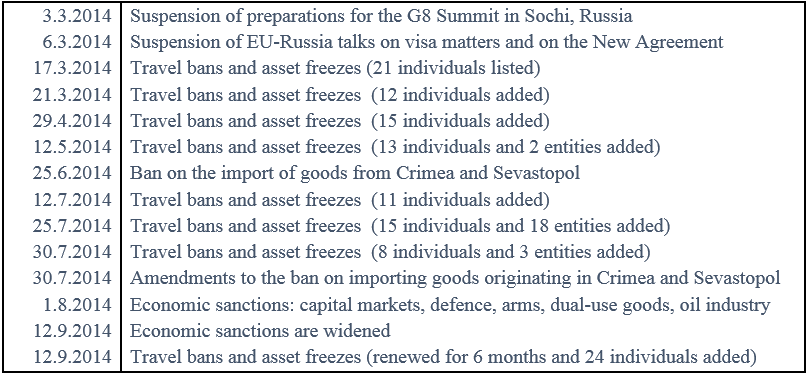It all began with the Russian unilateral annexation of Crimea in March 2014, after which the European Union (EU) and the United States introduced a set of political and economic sanctions against Russia. While Russian violations of the sovereignty and territorial integrity of Ukraine only escalated, these sanctions grew in scope throughout the year.
The table below lists all EU sanctions against Russia in 2014.
By applying additional economic measures to diplomatic pressure the EU and US expressed disapproval of the Russian violation of fundamental international norms and, at the same time, wanted Russia to reconsider its involvement in Ukraine. Instead of taking a step back, on August 6, 2014 Russia imposed counter-sanctions against the EU, as well Australia, Canada, Norway and the United States.
Unquestionably, the sanctions against Russia over the situation in Ukraine have imposed a long-term cost on Russia for its violation of key international norms, in particular a grave violation of the territorial integrity and sovereignty of a state. But since sanctions accrue economic costs on both sides, the EU sanctions have imposed economic costs on the EU itself, affecting EU member states in different ways and magnitudes.
Sanctions are not just counterproductive and harmful to the citizens on both sides, but they are also ineffective as they rarely achieve their goals. In fact, the Peterson Institute for International Economics’ database reveals that only 20% of the 172 cases of economic sanctions in place since World War II achieved their goals.
Among the reasons why sanctions are failing we may find:
-
Reaching diplomatic agreement between countries often requires much time;
-
Countries with limited or adversarial relations do not have any interest in resolving the problems that lead to sanctions;
-
Policymakers often inflate expectations of what sanctions can accomplish;
-
A large coalition of sender countries does not necessarily make a sanctions episode more likely to succeed;
-
Autocracies and dictatorships are much more resistant to sanctions than democracies.
Interestingly, most statesmen are aware of the limited success of sanctions. Still, they often invoke them in response to a demand from the public to react to international conflicts and other developments. However, as the costs of sanctions incur on home soil, public support for them erodes, and statesmen are then more inclined to speak frankly about them.
In the case of the EU sanctions against Russia, it did not take long before the citizens of the EU began to bear the costs of these sanctions. Consequently, it became increasingly more common to hear in Brussels distinct voices that the EU sanctions needed to be reconsidered. Most importantly, the sanctions have failed to achieve the goal of changing Russia’s involvement in Ukraine. Taking that and the costs to the EU itself into account, the EU is considering not extending them beyond one year, which is the time limit with which they were originally set.
Lastly, after the implementation of sanctions against Russia, EU foreign policy has struggled to maintain unanimity among the member states for support of the sanctions as well as in presenting a clear vision of its goals for the region, raising old concerns over the effectiveness and even necessity of such a foreign policy. As it is, the EU sanctions against Russia highlight weak leadership with regard to EU foreign policy, which has been substantially influenced by the largest EU member states, primarily Germany.




